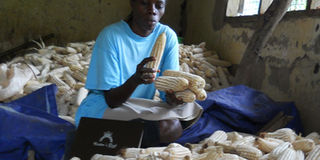Comesa to support members on aflatoxins

A farmer sorts maize cobs in a store. Most grains in Africa are prone to contamination while in storage. FILE PHOTO
What you need to know:
Uganda will be a beneficiary of support from the Common Market for Eastern and Southern Africa (Comesa) to certify laboratories testing for aflatoxins in various products.
Uganda will be a beneficiary of support from the Common Market for Eastern and Southern Africa (Comesa) to certify laboratories testing for aflatoxins in various products.
Martha Byanyima, coordinator for Comesa’s sanitary and phytosanitary programme, said through proficiency testing and mutual recognition, 11 laboratories from the participating countries will recognise each other’s results and certificates of analysis.
“This will simplify food safety regulation in the region and reduce the cost of trading food staples (particularly maize and maize products), by eliminating multiple testing and inspection in the exporting and importing countries,” she said.
Impede trade
The mutual recognition will support a network of specialised laboratories in member states with competence in aflatoxin analysis and certification.
The initiative will involve training grain traders associations, millers and processors on sampling and testing for aflatoxins.
The target laboratories include four in Kenya, two in Malawi and one each in Rwanda Uganda, Zambia, Zimbabwe and D. R. Congo.
Currently, no mutual recognition of standards and equivalence of food safety systems exist for foods crossing borders. This continues to impede trade within the Comesa area.
Report
This month, a report was presented to a meeting of regional food commodity experts, which was held in Dar es Salaam, Tanzania.
It showed that staple foods crossing borders in Comesa countries are subjected to assessment procedures and protocols in both exporting and importing countries.
This increases costs and, in some cases, hinders trade.
The report notes that “without mutual recognition of technical standards and equivalence of food control systems, underpinned by mutually agreed standard operating procedures (SOPs) for traders and inspectors, multiple inspections and testing in the exporting and importing countries persist and continue to cause an unpredictable regulatory environment that comes at a high cost to traders.”
It cited Kenya as a case in point. A maize-deficit country that supplements its stocks through imports from Uganda, Tanzania, Malawi and Zambia among others.
In 2014/2015, the maize deficit gap was reportedly 900,000 metric tonnes.
All maize imported into Kenya, including from East African Community partner states, is subjected to conformity assessment checks against the East Africa Standard (EAS 2:2013) related to broken and discoloured grains, moisture content and aflatoxin limits.
Harmonisation
In spite of harmonising maize standards and adopting the regional standard, EAC member states have not achieved full harmonisation.
Consignments from partner states still have to undergo aflatoxin testing and quality inspections at ports of entry.
The envisaged mutual recognition will achieve one-time testing in the exporting country and remove the need for additional testing in the importing country.
The two-day meeting was supported by US Department of Agriculture in collaboration with Comesa, International Institute of Tropical Agriculture, African Agricultural Technology Foundation and research scientists working on aflatoxins.
Aflatoxins and contamination
Aflatoxin is a poison naturally produced by strains of the fungus Aspergillus flavus and related species. Although aflatoxin contamination poses a global problem, the impact of the problem is higher in tropical climatic regions.
The “hot spot” area is found in the latitudes between 40 degrees North and 40 degrees South of the equator, this includes the entire Africa.
Aflatoxin contamination commonly occurs in maize, groundnut, and crops of regional importance in Eastern and Southern Africa such as sorghum and millet.
The work plan
The Aflatoxin Proficiency Testing for Eastern and Southern Africa (APTECA) provided the external service will provide the proficiency testing scheme for the development of the mutual recognition framework.
In addition, the laboratory will support online training programmes on laboratory quality management systems.
European Union’s Regional Integration Support Programme has provided an expert to support the laboratories from the participating countries while the Usaid/USDA has provided the consultants to develop the harmonised sampling procedures.




